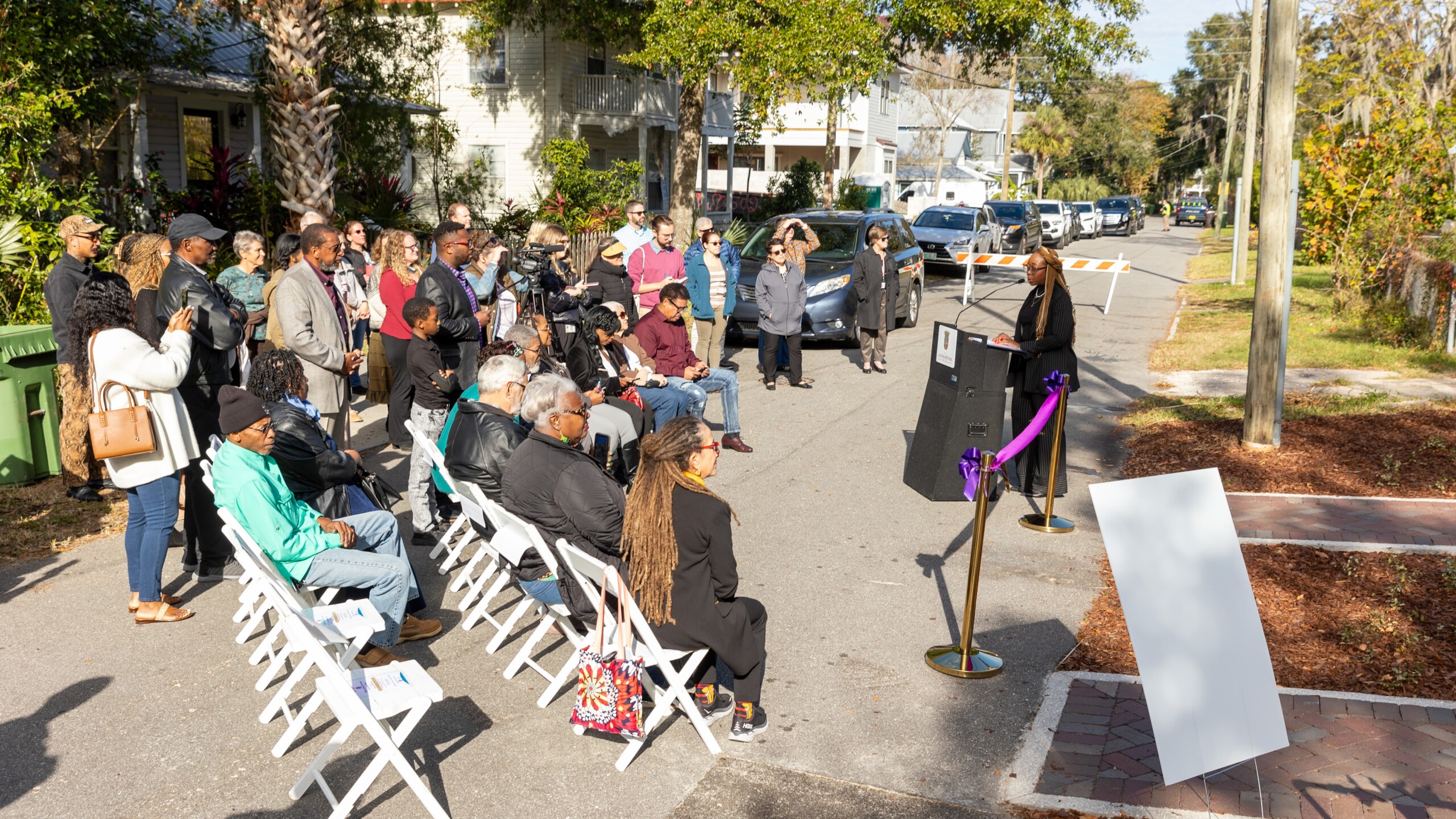Community improvement efforts in St. Augustine’s recently minted West City Community Redevelopment Area could be stymied if state lawmakers approve a pair of bills moving in the Florida Legislature.
Senate Bill 1242, introduced by Ocala Republican state Sen. Stan McClain, would end most CRAs statewide by 2045 and prohibit these investment areas from starting any new projects or issuing debt funding after Oct. 1 of this year.
The Legislature created CRAs in 1969, managed by appointed Community Redevelopment Agencies, as a way to target tax dollars in areas considered blighted and entice private investment.
McClain argues that some CRAs have unaddressed financial mismanagement and show a lack of progress, despite oversight added by the legislature in 2019. Supporters call CRA investments a “game changer” for many communities.
The bill also prohibits cities and counties from creating any new CRAs after July 1 and sunsets most existing CRAs by Sept. 30, 2045.
An amendment approved to a similar bill in the Florida House, HB 991, filed by Cape Coral Republican Rep. Mike Giallombardo, would allow for CRAs to start and bond for new projects as long as they were completed by the agency’s official termination date.
In cities like St. Augustine. officials use tax increment financing dollars — or TIF money — in its three CRAs to help pay for affordable housing projects, pedestrian safety through streetscape improvements, historic preservation of institutional and residential structures and more.
Jamie Perkins, neighborhood services and CRA division manager for the city of St. Augustine, says the West City CRA board expects to adopt its inaugural redevelopment plan in June. It would include priority projects and guidance for future proposals.
She’s been following the bills’ progress and worries that the legislation as currently written would erase months of groundwork.
“Basically, all of the work that we’ve been doing over the last few years, establishing the CRA, trying to get this plan adopted, would be really for nothing, because we would not be able to implement anything that is identified,” Perkins told Jacksonville Today.
The West City CRA, west of Downtown St. Augustine just past the San Sebastián River, was approved in April 2024. Residents and business owners have started to see success in fighting the stigma that West City is a bad area of town, and the neighborhood has started to see some new business starts in recent years.
Perkins and CRA backers want to use TIF dollars and other CRA resources to repair sidewalks, fix damaged homes and address stormwater issues.
She says the legislation as written would have big consequences for rural Florida and places like West City, which she identifies as one of St. Augustine’s most marginalized neighborhoods.
“I really, really have concern for some of these new like rural communities in Florida, specifically (areas) that may need a CRA in five or 10 years, and then with this legislation, they would not be able to establish that,” Perkins said.
The TIF impact
TIF financing is a common practice in Florida cities and counties as a preferred way to provide tax incentives to private developers and property owners to rehab existing buildings or spark new development.
It redirects the growth in property tax revenue from existing property or the increased revenue generated from new development to help pay for projects.
In CRAs, it allows that increase in property tax revenue to stay in and benefit that neighborhood.
Perkins explains it like this:
“If you established a CRA last year — 2024 — and your property tax was $500 the next year, if you saw an incremental increase in your taxes, say it was $505, that extra $5 would go into a special trust fund or a special pot specifically for that area,” she said.
St. Augustine has two other CRAs — the Historic Area CRA established in 2000 and the Lincolnville CRA crated in 2013.
On April 16, St. Augustine’s Community Redevelopment Agency held the first of three events planned this year to celebrate the 25th anniversary of its founding.
In Jacksonville’s three Downtown CRAs, TIF dollars are redirected to fund retail enhancement grants to incentivize new restaurants and storefronts and provide property tax rebates to developers for housing and other projects called Recapture Enhanced Value Grants.
Both laws moving
Both versions of the CRA bill have seen movement in the Legislature. SB 1242 advanced through two committees and is scheduled for a hearing at 2 p.m Monday in the Senate Rules Committee.
In the House, it advanced through the State Affairs Committee but the Commerce Committee temporarily postponed it April 15.
McClain told the Senate Judiciary Committee on April 1 that the rationale for ending CRAs are reports he’s received of “some bad actors” from some CRA governing agencies.
McClain didn’t provide the committee with specific CRAs in violation, but he cited claims he’s received of CRA board members trying to provide themselves stipends where they are not allowed to be compensated and a majority portion of another CRA’s budget going to pay staff and other administrative costs.
Boynton Beach Democratic Sen. Lori Berman pressed McClain during the meeting about the CRAs that are “doing good work” in Florida.
“There’s evidence probably on both sides, but, I think, in general, we’ve seen that a lot of the CRAs have outlived their mission or they’ve expanded their mission maybe beyond what the original mission of CRAs was, which was to remove blight,” McClain told the committee.
The Senate version cleared the Judiciary Committee 8-3 and the Community Affairs Committee on March 11 by a 4-3 vote.
Fort Lauderdale Democrat and Sen. Rosalind Osgood said during the Judiciary Committee hearing that the bill has her “sweating bullets.”
“The whole turnaround and transformation of several communities that have been slum and blight that are beginning to be places where people feel proud about living now, has been through the work of the CRA, and that work is not going to be done,” Osgood said.
Many Florida municipalities are concerned about losing the ability to create and maintain CRAs.
Florida League of Cities Deputy General Counsel David Cruz says his members are concerned about developer-led projects within CRAs that are in the works but will not fully obtain funding by Oct. 1.
He told the committee there could be a risk of cities breaching contracts between developers and CRAs if the bill moves forward.
McClain requested that legislators provide and cite examples of the positive work CRAs are doing as the bill moves forward.
Jacksonville’s CRAs
Lori Boyer, CEO of Jacksonville’s Downtown Investment Authority, says her agency is opposed to the bill as written.
“As a CRA that had many years of not having a positive cash flow on the Northbank that allowed us to do anything, and finally, having rounded a corner where we’re able to start executing on the projects in our plan … I would hate to see that nipped in the bud by not allowing us to do any further projects,” Boyer told Jacksonville Today.
She said part of the concern around CRAs appears to be between cities who are not benefiting from property tax dollars going to county-created CRAs.
Because Duval County and the city of Jacksonville has a consolidated government, that issue does not apply, she says. Boyer wants to see consolidated county-city governments be exempt from the CRA bill, if it passes.
The DIA board acts as the governing authority for the two Northbank and single Southbank CRAs.
There are seven CRAs in Duval County:
- Southside TIF district (Southbank), set in 2041.
- Northside West portion of the Downtown Northbank, set to in 2041.
- Northside East potion of the Downtown Northbank, set to expire in 2045.
- Renew Arlington CRA, set to expire in 2035.
- KingSoutel Crossing CRA, set to expire in 2038.
- Downtown Jacksonville Beach, set to expire in 2047.
- South Jacksonville Beach, set to expire in 2047.
A spokesperson for Mayor Donna Deegan says her administration also opposes the legislation and has been in contact with Duval County’s state legislative delegation and the city’s lobbyist to defeat or alter the bill.
”Jacksonville’s CRAs have been an essential tool to address blight, spur development, build affordable housing, improve parks and public spaces, and support small businesses – all without raising taxes or using state dollars,” city Chief Communications Officer Phil Perry told Jacksonville Today in an email.
”As a consolidated city-county government, the annual approval of the budget by one unified governing body ensures budget control and oversight not found elsewhere in the state,” he said “At the very least, we would like to see an exception added for consolidated city-county governments.”
Editor’s note: This story was updated April 21, 2025 to include comments from Mayor Deegan’s administration.







